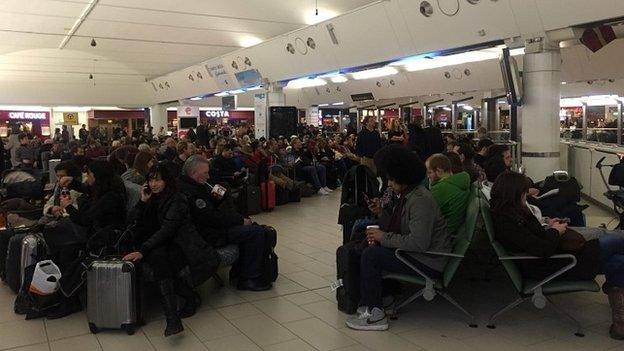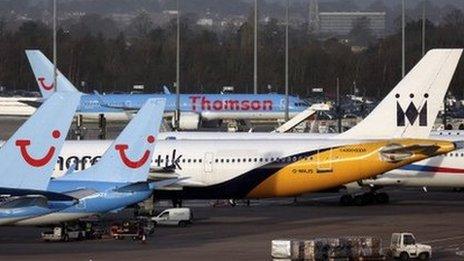Flight delay ruling opens way for compensation payments
- Published

A county court judge has ruled that airline Jet2.com cannot delay the payment of compensation due to passengers for delayed flights.
The ruling is likely to encourage thousands of passengers with similar claims in the UK.
Jet2 argued the compensation payments should be delayed pending the outcome of a similar case in the Netherlands.
But the judge at Liverpool County Court ruled that "a line should now be drawn. Justice delayed is justice denied".
The EU has ruled that airlines must pay compensation for delayed flights, but a number of airlines have yet to pay out.
Four airlines in the UK have made applications to delay payments: Jet2, Thomas Cook, Ryanair and WizzAir.
'Kept waiting'
The Jet2 case heard in Liverpool involved Kim Allen, who claimed €400 (£292) compensation after an almost seven-hour delay when flying from Manchester to Malaga in 2012.
"We've all been kept waiting for so long, but I'm really happy with today's decision," she said after the judge's ruling.
"Hopefully now it's time for the airlines to pay us what the law says they should."
Her solicitor, Kevin Clarke from Bott & Co, said he hoped "the airlines will now finally face up to their obligations to passengers and to settle the hundreds of thousands of legitimate claims outstanding.
"Sadly, the history of their conduct over the last decade would tell us to expect yet another legal challenge."
Disproportionate
The issue stems from the 2004 European regulations that oblige airlines, in some cases, to pay compensation to passengers for cancellations and delays, if they are not due to extraordinary circumstances.
A further ruling by the European Court of Justice in 2009 confirmed that delayed passengers should be treated as if their flights had been cancelled, if the delay was longer than three hours, entitling them to cash compensation.
Despite the ruling, a number of airlines in the UK are still arguing that some technical problems should be classified as extraordinary circumstances, and as such, no compensation should be due.
They have also argued that paying compensation for delays of three hours or more is disproportionate and too great a burden.
- Published19 June 2014

- Published12 June 2011

- Published16 February 2011
- Published17 August 2010